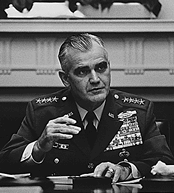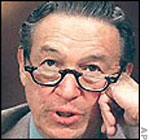“The Uncounted Enemy: a Vietnam Deception”
 Westmoreland vs. CBS was a legal battle in 1984 and 1985 that pitted the proud former commander of United States forces in Vietnam against a respected news organization that had been the home of such venerable correspondents as Walter Cronkite and Edward R. Murrow. Retired General William C. Westmoreland filed a $120-million libel lawsuit against CBS over the 1982 news program "The Uncounted Enemy: a Vietnam Deception," which accused the general and other top military officers of conspiring to misrepresent enemy troop strength, in particular the Viet Cong's militia forces, in order to suggest the Vietnam war had been progressing better than it actually was. The trial replayed the antagonisms between the military and the news media that had been apparent during the war, especially after the Tet offensive, which convinced many journalists that the war was being lost and that the military was deceiving the public.
Westmoreland vs. CBS was a legal battle in 1984 and 1985 that pitted the proud former commander of United States forces in Vietnam against a respected news organization that had been the home of such venerable correspondents as Walter Cronkite and Edward R. Murrow. Retired General William C. Westmoreland filed a $120-million libel lawsuit against CBS over the 1982 news program "The Uncounted Enemy: a Vietnam Deception," which accused the general and other top military officers of conspiring to misrepresent enemy troop strength, in particular the Viet Cong's militia forces, in order to suggest the Vietnam war had been progressing better than it actually was. The trial replayed the antagonisms between the military and the news media that had been apparent during the war, especially after the Tet offensive, which convinced many journalists that the war was being lost and that the military was deceiving the public.
On Saturday, January 23, 1982, CBS broadcast "The Uncounted Enemy: A Vietnam Deception," a program featuring producer George Crile and correspondent Mike Wallace, who was known for his aggressive interviews. In the opening segment, Wallace told viewers --
This program will present evidence of what we have come to believe was a conscious effort -- indeed, a conspiracy at the highest levels of American military intelligence -- to suppress and alter critical intelligence on the enemy in the year leading up to the Tet offensive.1
This statement would be the only time in the program that the word "conspiracy" would be used, but the thrust of the documentary was clear: General Westmoreland had deliberately misled the American public, media, and political leadership about enemy troop strength leading up to Tet.
“...the longest, bitterest battle in the history of American intelligence.”The Uncounted EnemyThe program arose from the ideas of former CIA analyst Sam Adams, who had tried to convince his superiors during the war that the Viet Cong had been undercounted. Adams told the program that he came across a captured enemy document that said there were 50,000 Communist guerrillas and militiamen in Binh Dinh province, but the official U.S. estimate numbered only 4,500. He concluded that the number of the enemy must be underestimated not only in Binh Dinh province but also throughout South Vietnam. Wallace claimed that Adams's "discovery would precipitate the longest, bitterest battle in the history of American intelligence."2
The program also featured members of the intelligence staff of General Westmoreland's command in South Vietnam, including Colonel Gains Hawkins and General Joseph McChristian. They said Westmoreland pressured them to undercount the enemy and keep the estimates under a 300,000-man ceiling. The main argument of the program was that General Westmoreland himself had pressured his officers -- and the CIA -- to undercount the enemy.
Under the intense questioning of Mike Wallace, the General  sometimes sounded befuddled. He stammered at some points: "I-I-I-I-well-no. No, no. I-no."3 Westmoreland would later say and an internal CBS probe would agree that he was misled about the main subject of the interview (the intelligence estimates), and that he did not prepare to defend himself in the arcane order of battle dispute.
sometimes sounded befuddled. He stammered at some points: "I-I-I-I-well-no. No, no. I-no."3 Westmoreland would later say and an internal CBS probe would agree that he was misled about the main subject of the interview (the intelligence estimates), and that he did not prepare to defend himself in the arcane order of battle dispute.
The most troubling part of the documentary for the general, given his stated devotion to old-fashioned virtues of honor and honesty, must have been the statement of one of his former officers. Producer George Crile asked General Joseph McChristian, "Are there statutes in the Uniform Code of Military Justice that would speak to that situation [falsifying the facts]?" McChristian said "Not that I'm are of. But there's something on a ring that I wear from West Point that the motto is: 'Duty, Honor, Country.' [Falsifying intelligence is] dishonorable."4 His honor publicly challenged, General Westmoreland would quickly respond to the CBS documentary, and former military and government officials and members of the media would come to his defense.
____________________________1"The Uncounted Enemy: A Vietnam Deception" (Transcript), CBS Reports, January 23, 1982, p. 1. Transcript included as appendix to Burton Benjamin, The CBS Benjamin Report: CBS Reports, "The Uncounted Enemy: A Vietnam Deception": An Examination (Washington: the Media Institute, 1984).
2Ibid., p. 2.
3Ibid., p. 25.
4Ibid., p. 12.
